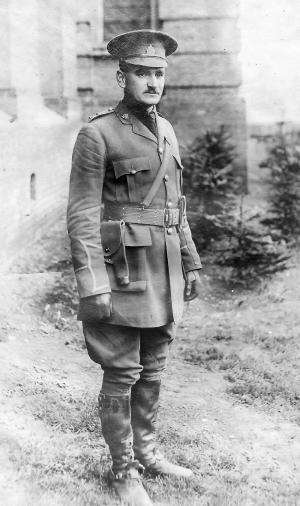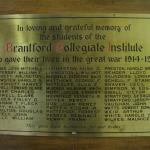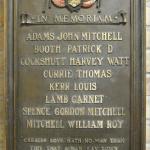BX November 21, 1914
A Send-Off to Lieutenant Harvey Watt Cockshutt
That Lieutenant Harvey Cockshutt of the 25th Brant Dragoons, who left this morning to join the overseas contingent, is popular in this city, and will be greatly missed by a large circle of friends, was the very evident sentiment of a pleasant supper party given in his honor by a number of more intimate friends at the Brantford Club last night. After supper Captain Towers, on behalf of his friends, presented Lieutenant Cockshutt with a handsome wrist watch which was to be an every-minute reminder to him that those who were bidding him God-speed last evening, would be constantly thinking of him while he was fighting for the Empire at the front, and eagerly looking forward to his safe return. Mr. Cockshutt modestly acknowledged the presentation and thanked his friends for their very kind expressions of regard. He had responded gladly to what he felt was a call of duty, and he anticipated that similar calls would come to many of those present before the triumphant entry into Berlin, and he knew that the call would be just as quickly responded to by his friends, some of whom he felt he would meet on the battlefield. Mr. Reginald Scarfe was the chairman of an informal toast list, and everybody was given an opportunity, which was eagerly grasped, to say a few words of good wishes to Lieutenant Cockshutt, the first volunteer from the Brantford Club.
BX August 19, 1920
Dedication of Memorial Camp, Dover – Harvey Watt Cockshutt Memorial Camp Formally Presented to Brantford Y.W.C.A. – Splendid Gift
(By a Staff Reporter)
PORT DOVER, Aug, 19, 1920 –
“On behalf of the young Women’s Christian Association I dedicate this camp for the glory of God and the good of the womanhood of the city of Brantford, the gift of Mrs. James Cockshutt, presented in memory of her son, the late Lieutenant Harvey Cockshutt.”
In these words Mr. George Wedlake, life member of the Y.M.C.A., and prominent summer resident of Port Dover, impressively dedicated the new Y.W.C.A. camp at Port Dover yesterday afternoon on the grounds of the camp, and from the hands of Master Jack Gibbons, the small grandson of Mrs. James Cockshutt, Mrs. W.S. Brewster, president of the directorate, received the deed of gift, while a large gathering of friends from Brantford and from the summer cottages witnessed the ceremonial under the happiest conditions.
The wonderland of out-of-doors was opened up to the Y.W.C.A. girls and the employed girls of the city in a new way this summer with the opening of these camps, and yesterday the promoters scheme saw how really successful their plan had become and how beautiful and healthful the sojourns were being made. The weather could not have been chosen more favorable and the place more suitably for the affair and many of the visitors interested in the welfare of the girls spent much of their time expressing their surprise over the surroundings, with the view from the cottage over the deep ravine and the wooded hills, made fragrant by the pines and the fruit trees, out to the sweep of sandy beach bordering the blue lake. Under the canopy of heaven and in this beautiful setting of nature the dedication ceremony took place.
None More Beautiful
Rev. W.G. Martin, pastor of the Congregational Church, was the chairman of the occasion and in a few words, every one of which was full of meaning, Mr. Martin made clear the importance of the event. Throughout the land, he said, numerous memorials were being given for soldiers who had fallen, but none was more beautiful or more fitting than the opening of this camp for the girls. Mr. Martin said he regretted that Mrs. Cockshutt was not there to express to her personally some appreciation for her kindness and thoughtfulness, for here was the realization of a dream of ambition of the highest order, for out of her sorrow she was giving joy to theirs, out of loss, increase out of death, life. The beautiful camp would be a perpetual memorial to her son, and he thanked God for the giving of such a gift.
Rev. Howard Deller, pastor of the Port Dover Methodist Church, welcomed the Y.W.C.A. directorate and their friends to the resort on behalf of the rest of the village clergy. Few words were needed from him, he said, for the beautiful spot was a greeting itself, and the people of Port Dover were delighted to have the camp opened up among them.
The Dedication
Following Mr. Wilson’s short address a song was beautifully sung by Miss Maude Taylor. Then Mr. George Wedlake made the dedication.
“We are here,” Mr. Wedlake said, “not merely to enjoy a garden party, but to dedicate this memorial camp for the glory of God and the good of the young womanhood of the city of Brantford.” There was reason to be thankful to God for His Son who came into this world, and by His coming made possible such occasions as this and made possible also the spirit and love and helpfulness that found expression in Mrs. Cockshutt’s gift of the camp. He was one of those he said, who believed that the world was getting better. The time had passed when the young men were the only consideration and now in every civilized country women were being given their place. The Y.W.C.A. was now flourishing in Brantford beside the Y.M.C.A. Mrs. Cockshutt said the speaker, in dwelling feelingly on the memorial gift, was touched by Jesus Christ in her action. When the war broke out Harvey Cockshutt’s words were: “I don’t want to go, but I feel it is my duty to go,” and he went. And there one morning in June, 1916, in a tremendous assault, he was wounded, and his comrades built a parapet of sandbags about him, but the Germans came on and they were obliged to leave him, and he was never heard of again until February, 1917. His mother in giving this to the Y.W.C.A., Brantford, was keeping alive the memory of the sacrifice of her only son.
The Formal Gift
It was touching then to see little Jack Gibbons step to the platform to take the place of his grandmother and to present the deed of gift to Mrs. W.S. Brewster, making through her, the directorate the owners of the property. Mr. Wedlake placed his hand on the head of little Jack and reminded him he was the great grandson of Ignatius Cockshutt, a name that was connected with hundreds of schemes for betterment in the city of Brantford, and that was ever held in high esteem.
The Acceptance
Mrs. Brewster holding the deed in her hand spoke briefly. She found it difficult, she said, to express the appreciation of each individual member of the directorate to Mrs. Cockshutt, who was herself a charter member but each one was determined to make it a camp of pleasure, peace and restfulness for the girls. She spoke of the work of the camp committee of which Mrs. J.M. Shuttleworth is the convener, and she extended a welcome to the people of Port Dover to visit the camp.
A little surprise followed this, little Miss Kathleen Gibbons was called to the platform and as Mrs. Brewster explained that it was Mr. Wedlake’s birthday, the little maid presented him with an armful of flowers.
When the program was over the guests wandered over the whole camp, buying home cooking on one verandah, or having tea on the screened verandah of the second cottage, or having fortunes told in the third cottage. Those who wished remained in their places and were entertained by a concert of dances, singing and recitations by ten of Miss Whitney’s girls, the part singing being particularly admired. Those who figured in this part of the program were Hilary Wallis, Myrtle Clark, Loreen Schuler, Bessie Scott, Kate Axford, Katharine McKay, Anna McCann, Gladys Clark, Margaret Smiley and Dorothy Clement.
The Memorial Camp
There are three cottages included on the property, situated next to the summer home of Mr. George Wedlake. This year, however, one of the cottages has been rented and only two are in use. An admirable arrangement has been made where by the girls “live” in one of the cottages and sleep in the other. The tables are set in the large common room of one and behind this is the kitchen, where a huge and up-to-date gas stove forms a very important part of the furnishings, for the young appetites are well satisfied at this camp, under the direction of the house mother, Mrs. Tanney. Upstairs there are separate rooms if the campers desire it, but most of the girls find it much jollier to sleep in true camp fashion in one of the beds on the upper verandah, that is all screened in and yet receives the full benefit of the outdoor breezes.
In the neighboring house there is the large sitting room that in normal times, when the camp is not invaded by the directorate, is made attractive and cozy with easy chairs, a large centre writing table and lounge with needful cushions. The big fireplace gives a welcome to all and attractive posters tell of planned sports. After a swim, a paper chase and peanut hunt, girls indicate good times.
The girls in camp tell of happy, joyous times together. They do not have to be at breakfast until 8.30 and no one minds giving a few minutes of the morning to help in straightening the camp and seeing that there are enough potatoes peeled for dinner. These take but a fraction of the time during the day.
One of the best contrivances in this part of the camp is the transformation of what would normally be the kitchen into a room where the girls can come to directly after a swim. The camp is placed so that the girls have a private pathway to the beach and are able to run back to camp and change without going near the public bath house or the park.
Upstairs here, there are also rooms for those wanting them and also the line of beds displaying the quilts that the girls worked on during the winter, in gay array. There is a large room that does duty for a bath room for the girls and where they can dress and wash and splash away in camp fashion with no harm done. “I had no idea it was so lovely,” was the expression of surprise heard on all sides from those who visited the camp for the first time.



